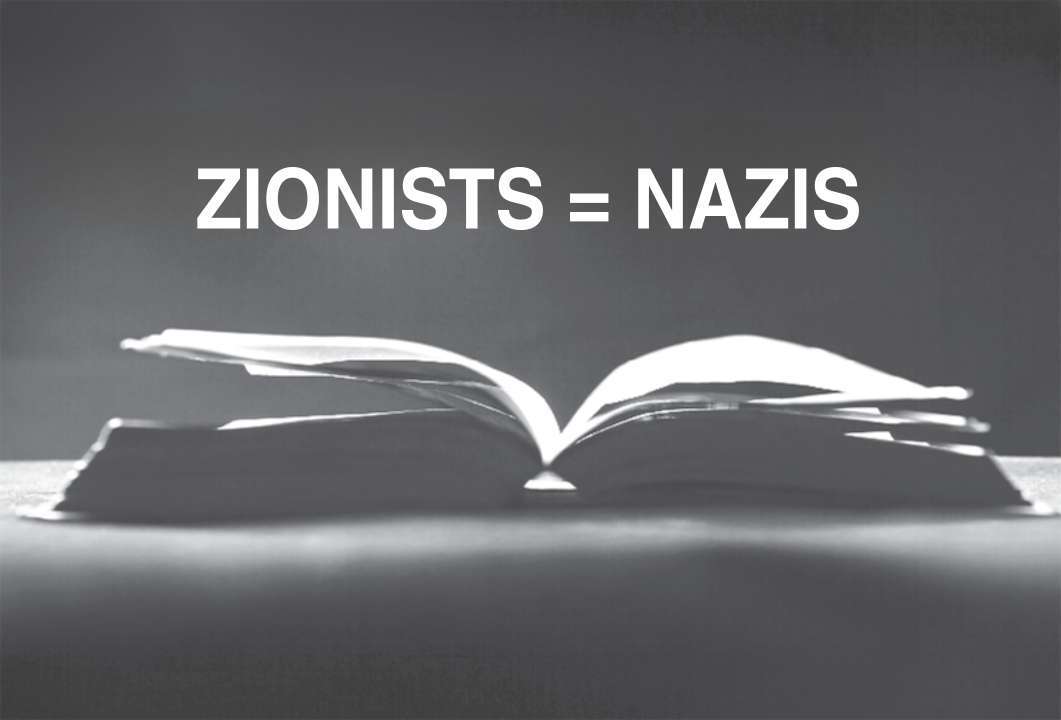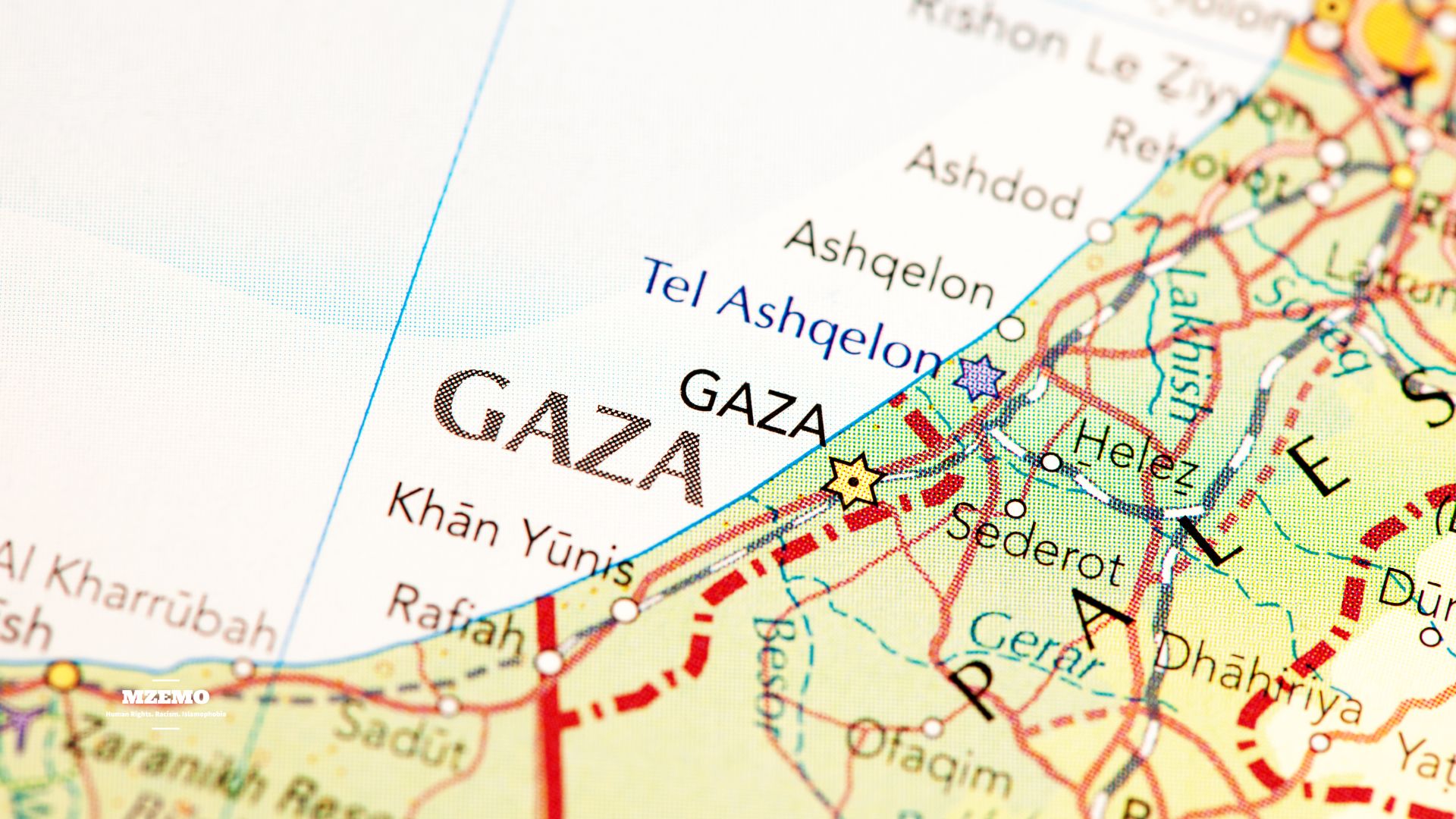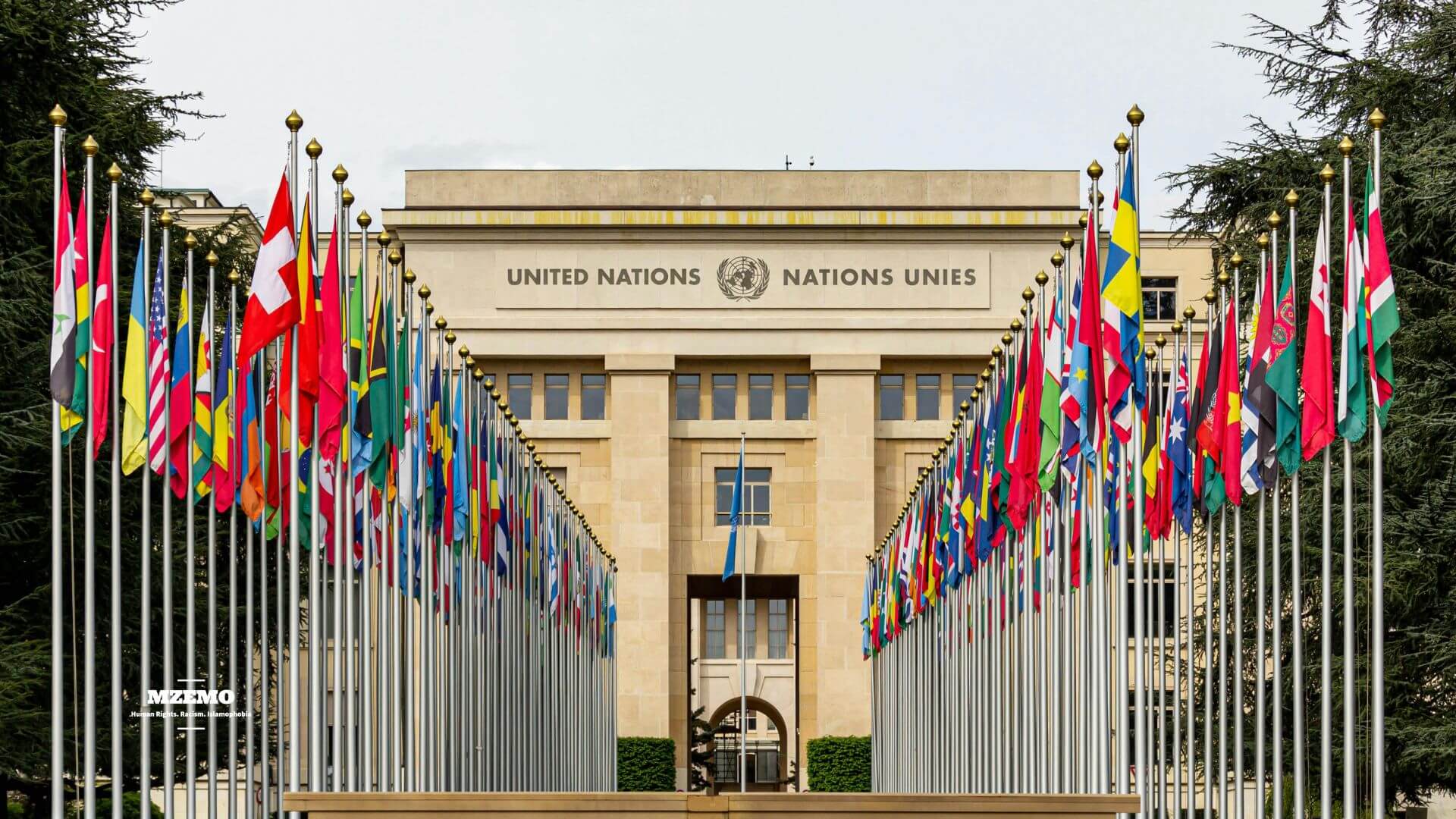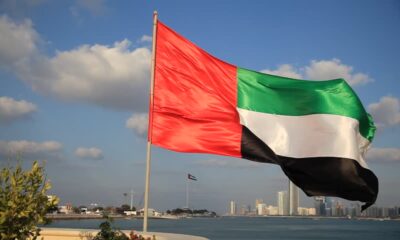Featured
Is Zionism Truly Anti-Nazism?
Published
3 years agoon

In its rabid efforts to demonize Israel’s Palestinian victims, the Zionist propaganda machine, known as Hasbara, repeatedly cites a famous meeting between Palestinian national leader Hajj Amin Husseini, and German Führer Adolph Hitler in 1941, as an “indicting evidence” proving Palestinian collaboration with the Nazis. In fact, Zionist propagandists weaved and continue to weave all sorts of farfetched tales concerning that inconsequential meeting.
In fact, the Zionist machine of mendacity would go as far as claiming that the Palestinians bear a major share of responsibility for the Holocaust as a result of that meeting.
The real truth, however, is that such nefarious lies, though perfectly characteristic of the classical Zionist discourse, are knowingly used to mitigate the brutal ugliness of the ongoing Zionist holocaust against the Palestinian people.
Read also : Israel Has No Right to Exist if Palestine Has No Right to Exist
In fact, the vast majority of Palestinians in the 1930s and early 1940s, probably knew next to nothing about Germany. Palestine then was under the harsh British occupation, known as the mandate, whose ultimate goal was to prepare the country for the establishment of the malignant racist entity known as Israel.
Very few Palestinians visited Germany during that period, and, similarly, very few Germans visited Palestine, probably with the exception of a small number of orientalists, anthropologists, archaeologists and missionaries.
Hence, the claim that the Palestinians who were languishing under an British military occupation did have particularly friendly ties with the Germans can’t withstand academic scrutiny for two minutes.
Read Also : Moving British Embassy from Tel Aviv to Jerusalem is huge insult to 2 billion Muslims
Yes, most Palestinians hated their British occupiers who were actually devising one of the greatest crimes against humanity of all times against a simple, pastoral and unsophisticated peasant community.
We hated our British tormentors…and we still do
I don’t deny the possibility that many Palestinian nationalists of that time might have wished victory for Germany and defeat for the British. Such feelings are quite normal and natural, to say the very least. But to interpret the Palestinian anti-British feelings as support for the Holocaust would be tantamount to fornicating with the truth and historical facts.
Besides, the Zionist movement then, as now, had a big clout on British policy makers. Hence it was quite logical and expedient for Palestinian leaders of that time to seek support for their just cause from Britain’s main foe, namely Germany. This didn’t mean at all that the Palestinians backed or identified Germany’s racist Nazi ideology or, indeed, its purported plans to exterminate.
Zionism had good chemistry with the Nazis prior to the Holocaust
There is a preponderance of crucial data pertaining to Zionist collaboration and cooperation
With the Nazi leadership, although the Nazi anti-Semitism policy had been well-known since 1933. Yet the Zionists, either directly or otherwise, maintained an extensive though secret contacts with the Nazi authorities, though the Zionist aim beyond these contacts was mainly to expedite the Zionist scheme in Palestine, rather than save or free Jews from the genocidal clutches of German anti-Semitism.
In the context of these contacts between Zionists and the Nazi authorities, the Nazis showed a certain willingness to allow hundreds of thousands of Jews to emigrate to the U.S. and other countries in return for certain tactical concessions from the allied countries. This meant that hundreds of thousands of Jews could have been spared gas ovens and concentration camps had the German demands been met. But the Zionist movement, which exerted disproportionate influence on American and British leaders, especially in relation to Jewish issues, adamantly refused the German overtures, with some Zionist leaders arguing that 50,000 Jews going to Palestine were preferred to a million Jews allowed to emigrate to North America.
Jewish soldiers serving in German armies
According to some Jewish historians, thousands of Jewish soldiers served in the German armed forces, including the Wehrmacht, SS and the Gestapo. The Judenrate (Jewish councils) were administered at the low and medium levels buy Jewish officers. The late Israeli historian, Israel Shahak, pointed out that Jewish families in Nazi-occupied Eastern Europe feared Jewish soldiers manning Nazi-roadblocks more than they did German or other soldiers. The Jewish soldiers were especially harsh and brutal to their co-religionists, probably to impress their German superiors.
Modern Zionist propagandists, even historians, strive to avoid or evade such embarrassing chapters of that era. They flatly deny that thousands of Jewish soldiers served in the Nazi armed forces, claiming that these soldiers were only partly Jewish and that most of them had Jewish fathers and non-Jewish mothers. In short, they employ the Same twisted arguments in dismissing this phenomenon as some ardent Zionists do in denying the presumed non-Semitic Origin of the bulk of Ashkenazi Jews.
I am speaking about prevarication, decontextualizing event, making sweeping generalizations out of rare or isolated events as well as indulging in sheer lies, while hurling the ant-Semitic scare-bomb at those disagreeing with the Zionist narrative, even if these people happened to be Jewish or even Holocaust survivors such Shahak and Zeev Sternhell.
Stalin’s Jewish aides
Although, Adolph Hitler is widely viewed as the most evil mass murderer in the history of mankind, it is probably safe to argue that Joseph Stalin was more nefarious a murder, given the huge number of his direct and indirect victims.
According to some estimates, Stalin was directly or indirectly responsible for the death of 6 million to 20 million people during his prolonged rule.
The huge number of victims occurred as a result of unrelenting political executions or indirectly as a result of Stalin’s policies such as the Gulags and other induced famines, collective deportations, and his sustained campaign of purges which lasted more than two decades.
Some of Stalin’s most diabolic crimes included the attempted physical liquidation of entire social classes, induced famines which caused the death of millions, the Gulags and the deportation of the Crimea Tatars and other ethnic peoples The Soviet authorities used cattle trains to deport these mostly Muslim peoples, mainly children, women and the elderly to Uzbek SSR and other remote destinations. Thousands died during the deportation journey while tens of thousands perished later due to the harsh exile.
Most Western historians evade or ignore the fact that many of these gigantic crimes were supervised and carried out by Stalin’s Jewish aides who directly reported to Stalin.
I know that very few people would venture to sale in these “uncharted waters” for fear of being accused of hostility to Jews.
None the less, Zionist Jews must realize that they are not exactly history’s angelic victims and that they do have much to be ashamed of.
Good chemistry between Israeli and fascist governments
Today, Israel, which claims to follow a principled policy against fascism and racism anywhere in the world, is maintaining close, even cordial working relations with fascist regimes and groups around the world.
Israel is maintaining close ties, bordering on actual alliance, with the BJP regime in India. Needless to say, this regime is deeply racist, scandalously Islamophobic and hopelessly fascist. It is a regime that upholds the racist mantra that “to be a true Indian, you must be a true Hindu and thoroughly anti-Islamic.” This mantra is an identical copy of the racist Israeli Nationalism Law which states that ” in order to be a complete citizen of the state of Israel, one must be Jewish.” It is also worth mentioning, that the Israeli domestic intelligence agency, the Shin Bet, has advised the Indian security apparatus to adopt some of the most vengeful measures used against Palestinians, and use these tactics against Indian Muslims. This includes the widely condemned practice of home demolition, which is already being used in some Indian states like Ultra-Pradesh.
In Europe, Israel has good ties with the new fascist regime in Italy, which has assured Zionist circles that Italian fascism would target Muslims, not Jews. Israel also has excellent ties with the quasi-fascist regime of Hungary.
Moreover, Israel has also had and continues to have warm relations with anti-Islam movements in Britain, Germany, France, Sweden and Netherland. These racist movements are disguised as anti-immigrant movements although Islam and Muslims are their ultimate target. A few years ago, Dutch far-right anti-Islam politician Geert wilders was invited to Israel where he was warmly welcomed by the Israel government. Wilders eventually converted to Islam to the chagrin of his former Zionist friends. His conversion to the religion he had hated most stunned Islamophobic and Zionist circles in Europe and Israel.
And in America, Israel has had cordial ties with Evangelical Zionists who support, soul and heart, Israel’s repression of the Palestinians, although some Zionist Jews don’t hesitate to call Jesus Christ “the Hitler of Bethlehem.”
The same thing can be said about every fascist leader under the sun, who is usually courted by Israel and encouraged to pursue his or her anti-Islam discourse.
Conclusion:
So, the next time you hear or watch a Zionist spokesperson accuse the Palestinians of collaborating with the Nazis, you should immediately realize that you are encountering a sly liar. In the final analysis, Israel itself is now considered one of the world’s main hotbeds of fascism, especially after recent elections which brought to the fore Nazi-like parties which consider non-Jews lesser or infra human beings. Don’t be bamboozled by their lies. Such values as truth, honesty and justice don’t exist in the unholy Bible of Zionism
You may like
Featured
The 20-Point Gaza Plan: A Blueprint for Dispossession?
Published
3 days agoon
October 6, 2025
As Gaza’s hospitals ran out of oxygen and children continued to die of hunger, a new “Peace Plan” emerged from Washington. The US President Donald Trump’s 20-Point Gaza Plan was announced recently in late September 2025. It has promised to rebuild Gaza and bring “a new era of stability.” However, to many Palestinians and observers across the world, it sounded like something else: a blueprint to erase what remains of Gaza’s sovereignty. What was initially discussed with the Arab states as a cooperative humanitarian initiative was, by the time of its release, cleverly reshaped. It is rewritten to preserve occupation under a new label.
From Arab Consensus to American Control
Early drafts of a postwar Gaza plan were reportedly framed through consultations among Arab and Muslim nations. They emphasized three principles: Palestinian self-rule, unrestricted humanitarian access, and reconstruction without foreign trusteeship. Yet as negotiations evolved, the plan was absorbed by U.S. diplomacy and redrafted in a way that aligned with Israeli conditions rather than Arab consensus. Several diplomats confirmed that Washington’s version quietly removed any reference to Palestinian sovereignty, replacing it with phrases like “transitional governance” and “security oversight.”
Even before it was officially unveiled, Reuters reported growing unease among Arab delegations, who complained that the new text ignored their agreed-upon points and reflected Israel’s security agenda. Pakistan’s foreign minister stated openly that “Trump’s 20-Point Gaza Plan is not our plan.” The shift marked more than a diplomatic re-edit as it exposed the power imbalance shaping Gaza’s future.
The 20 Points: Promises and Omissions
Publicly, Trump’s 20-Point Gaza Plan claims to rest on four pillars: ceasefire, hostage release, reconstruction, and demilitarization, yet its deeper clauses reveal troubling gaps. There is no guarantee of Palestinian sovereignty, no timeline for Israeli withdrawal, and no provision for international accountability. Instead, it envisions Gaza’s future under external trusteeship, with reconstruction funds controlled by a multinational board led by Washington and oversight committees dominated by Israel and allied states.
Several points speak of creating “safe redevelopment corridors” and “security zones,” terms human rights experts warn could mask forced relocations and demographic engineering. The plan further ties aid to behavior clauses, conditions governance on foreign approval, and places border control under “temporary supervision,” a phrase that critics fear means indefinite control. Amnesty International cautioned that “reconstruction must not become a pretext for displacement or collective punishment.”
In essence, while the plan’s language of peace and rebuilding appeals to diplomacy, its structure embeds dependency and control. To rebuild Gaza without granting it freedom is, as one Palestinian analyst put it, “to rebuild the prison walls, just higher and cleaner.”
The Human Cost Hidden Behind Diplomacy
Behind every clause of this plan lies a humanitarian catastrophe. The World Health Organization confirms that more than half a million people in Gaza face famine-level hunger, and over 360 have already died from malnutrition. The UN’s humanitarian office says 80% of Gaza’s population now depends on aid that Israel continues to restrict. In this reality, talk of “redevelopment corridors” rings hollow. Gaza does not need trusteeship—it needs food, medicine, and an end to the siege.
On the streets of Rafah and Deir al-Balah, survivors of months of bombardment heard the plan’s announcement with disbelief. “They speak of building new homes,” one displaced teacher told a reporter, “but they won’t even let cement cross the border.” Another woman asked, “Who gives them the right to plan our lives while we bury our dead?” These voices reveal the heart of Gaza’s objection: no document signed abroad can substitute for the will of its people.
Resistance and Rejection
Hamas’s initial response to the plan was mixed. The group welcomed references to reconstruction and aid delivery but rejected disarmament and external trusteeship. “No peace built on surrender will last,” its spokesman said. Across Palestinian civil society, activists dismissed the plan as “occupation repackaged.” Hashtags like #NoTrusteeship and #GazaIsNotForSale flooded social media, uniting Gazans and diaspora voices in digital defiance.
Former U.S. diplomat Robert Malley, writing for Le Monde, described the plan as “a maze of ambiguities and potential pitfalls.” His analysis noted that the proposal’s vagueness is deliberate—creating space for powerful states to interpret its clauses to their advantage. It is a familiar strategy: promise reconstruction while ensuring dependency.
Reactions among Arab and Muslim nations were cautious and divided. The Arab League issued a restrained statement calling for further review, while countries like Algeria, Iran, and Pakistan warned that any plan lacking Palestinian representation was unacceptable. Meanwhile, Western governments praised the proposal as a “bold step toward stability.” For Gazans, these words offered little comfort. They have seen such language before in the Oslo Accords, the Road Map, and countless other documents that delivered control, not liberation.
International law offers a clear measure. The plan’s idea of trusteeship contradicts the principle of self-determination guaranteed by the UN Charter and multiple General Assembly resolutions. Legal scholars argue that placing Gaza under external administration without consent would constitute a new form of occupation. The International Court of Justice’s 2024 advisory opinion warned that “peace agreements cannot validate the continuation of unlawful control.” Trump’s plan, critics say, does precisely that.
What True Peace Would Look Like
A genuine peace framework would begin not with political engineering but with justice. It would:
- End the blockade entirely, allowing Gaza to trade and rebuild freely.
- Place reconstruction under Palestinian-led management, not foreign trusteeship.
- Hold accountable those responsible for war crimes and the starvation policy.
- Guarantee the right of return and compensation for the displaced.
- Empower Gaza’s people to elect their own representatives without external approval.
Anything less is not peace but an administrative occupation.
The Moral and Legal Test for the World
The 20-Point Plan is not a diplomatic breakthrough but a moral test. To accept it as written would mean endorsing a future where Gaza remains controlled by the same forces that destroyed it. It would normalize collective punishment under the banner of reform. And it would bury the core demand that Palestinians have made for decades: the right to decide their destiny.
Human Rights Watch, Amnesty International, and UN experts have all warned that Gaza’s crisis cannot be resolved through imposed governance. The path forward must restore dignity, not dependency. Yet, while the world debates corridors and committees, Gaza’s hospitals run without light, and its children die nameless in the dark.
The Bottom Line
Trump’s 20-Point Gaza Plan may speak the language of peace, but its structure carries the logic of control. For Gaza, peace cannot be built by those who silence its voice. True reconstruction will not come from Washington or Tel Aviv, but it will rise from the streets of Khan Yunis and the refugee camps that still believe in freedom.
The people of Gaza do not reject peace but subjugation disguised as diplomacy. Their message to the world remains clear: “We will rebuild, but on our own terms.” And until that right is honored, no plan, however polished, can claim the name of peace.
Featured
Global Sumud Flotilla Intercepted: Israel’s Naval Siege, Famine and Resistance
Published
3 days agoon
October 6, 2025
The Mediterranean dawn on 2nd October, 2025, was meant to carry a different story. For hundreds of activists aboard the Global Sumud Flotilla, including doctors, artists, parliamentarians, and volunteers from over 37 countries, it was a mission of a lifetime. Their ships carried medical supplies, food packets, and a message written in humanity’s oldest language: solidarity. However, as Israeli naval vessels surrounded them 40 nautical miles from the Gaza Strip, that message was silenced most brutally. Within hours, the flotilla had been seized, its passengers zip-tied and blindfolded, and its aid confiscated.
Israel’s interception of the Global Sumud Flotilla is not just a naval incident but another chapter in the long story of Gaza’s suffocation. In a land already starved by siege, famine, and bombardment, this act tightened the blockade around two million civilians who had endured what human rights organizations now recognize as a continuing genocide.
Gaza in Famine: A Manufactured Catastrophe
According to the World Health Organization, over half a million Palestinians are now living under confirmed famine conditions. Malnutrition has become a silent killer, claiming the lives of more than 360 Palestinians, including 130 children. The Integrated Food Security Phase Classification (IPC) places Gaza in Phase 5, which is the highest possible level of hunger emergency, categorized as Catastrophic. Gaza’s farms, bakeries, and water networks have been systematically destroyed, leaving families with little more than contaminated water and animal feed to survive.
The famine is not a natural consequence of war but a lethal weapon. Amnesty International has repeatedly stated that Israel is using starvation as a method of warfare, an act that meets the legal threshold for genocide.As per a report of Amnesty International published in October,
“Israel’s deliberate starvation of civilians is a war crime.”
Each blockade, each denied aid truck, and now each seized ship deepens this crime against humanity.
What is the Global Sumud Flotilla?
The flotilla, meaning steadfastness in Arabic, embodied the principle of Sumud, which means unshakable resistance. It consisted of more than 40 vessels and 500 international participants from 37 countries. Departing from ports across Europe and North Africa, it aimed to reach Gaza’s coast peacefully and symbolically challenge Israel’s naval siege. Among those on board were parliamentarians, humanitarian doctors, and activists, including climate advocate Greta Thunberg, united under one flag: human conscience.
Their mission was not to wage war, but to deliver aid and visibility. Yet as their ships neared Gaza, Israeli drones shadowed them, communications were jammed, and warning messages filled the airwaves. Finally came the interception.
The Interception: How the Siege Struck at Sea
Around midnight, Israeli commandos surrounded the final ship, Marinette, approximately 42.5 nautical miles off Gaza’s shore. Activists reported being forced to kneel for hours, zip-tied and beaten, as soldiers confiscated cameras and personal belongings. All contact was cut as the ships were redirected to Ashdod Port inside Israel. The Israeli military justified the action by claiming the flotilla violated a lawful blockade and that “no humanitarian aid was found aboard,” which is a statement disputed by multiple international witnesses.
More than 450 activists were detained, among them citizens of Spain, Italy, Turkey, South Africa, and the United States. Many were held without immediate consular access, with reports of inhumane treatment emerging within days. Amnesty International condemned the detentions as “an unlawful act of aggression” and a “deliberate effort to enforce collective punishment through starvation.”
Before communications were cut, Irish activist Tadhg Hickey recorded a final message: “We sail not just for Gaza’s survival, but for our own humanity. If silence is complicity, then to sail is resistance.” His words have since circulated across social media, embodying the flotilla’s spirit of nonviolent defiance.
Survivors deported to Turkey later described their ordeal. “We were treated like criminals for carrying food,” one volunteer said. “They zip-tied our wrists until they bled, but we’d do it again because Gaza is worth every risk.” Their testimonies echo the voices of thousands protesting globally after the interception, from London to Kuala Lumpur, demanding accountability and an end to the siege.
Law, Morality, and the Machinery of Blockade
The Israeli blockade, in place since 2007, has been condemned as illegal under international humanitarian law. The Fourth Geneva Convention forbids the collective punishment of civilians, and maritime law recognizes the right to deliver humanitarian aid in the face of mass suffering. Yet Israel continues to act with impunity, supported by global silence and diplomatic paralysis.
The United Nations Office of the High Commissioner for Human Rights (OHCHR) has warned that the blockade constitutes “a form of apartheid and starvation-based warfare.” Meanwhile, the UNRWA reports that 80% of Gaza’s population now depends on humanitarian aid for survival—aid that often never arrives.
Each intercepted vessel, carries a moral weight beyond its cargo. The Global Sumud Flotilla is more than a convoy; it was a reminder that humanity refuses to abandon Gaza to darkness. To criminalize compassion is to declare war on conscience itself.
Global Reactions and Outrage
Governments across the world have expressed alarm. Switzerland, Spain, and South Africa lodged formal protests, demanding explanations for the detention of their citizens. Turkish authorities arranged emergency flights to repatriate deported activists. Protests erupted in Paris, Istanbul, and Jakarta, as demonstrators carried placards reading, “Feeding Gaza is not a crime.”
Yet, in the corridors of power, condemnation remains cautious. Western governments have largely avoided direct criticism, framing the interception as a “security matter.” Meanwhile, humanitarian organizations, from Amnesty International to Human Rights Watch, have demanded that the blockade be lifted immediately and that the international community recognize the ongoing genocide.
The Broader Picture: Gaza’s Siege as Global Failure
The interception of the flotilla is not an isolated act, but the symptom of a global collapse of moral responsibility. While Gaza’s hospitals run without anesthesia and its children starve in makeshift tents, world leaders debate terminology instead of stopping the crime. Every intercepted aid convoy, every silenced activist, marks another day when humanity looked away.
The sea that once connected civilizations now separates the starving from salvation. Israel’s naval blockade is not a shield but a weapon. It starves, isolates, and erases. And yet, every time someone dares to sail toward Gaza, the truth resurfaces: even in the face of warships, the human spirit remains unsinkable.
However, the Global Sumud Flotilla did not fail, but it exposed the blockade for what it truly is: an act of cruelty sustained by silence. It reminded the world that solidarity still sails, that compassion still defies orders, and that Gaza’s struggle is humanity’s test.
Every intercepted ship tells the same story: that courage is contagious, that empathy is rebellion, and that the people of Gaza are not forgotten. The world may build walls of steel and propaganda, but the sea remembers those who dared to cross it—for justice, for life, and for Gaza.
Featured
If Law Still Means Anything: What the UN Genocide Finding Demands Next
Published
2 weeks agoon
September 28, 2025
A mother in Gaza scrolls past a headline on a cracked smartphone: “UN inquiry finds genocide.” The generator coughs once and dies. In the quiet that follows, the question is small and sharp: If law still means anything, what happens now?
What does the Finding Mean?
The UN Independent International Commission of Inquiry (CoI) concluded that Israel has committed genocide in Gaza. It has created conditions meant to destroy life. This is not a social media label but a formal UN investigation using the standard of “reasonable grounds to conclude.” It is not a criminal verdict that belongs to courts, but it triggers duties for states and institutions that signed up to prevent and punish genocide.
The findings sit alongside the International Court of Justice (ICJ) provisional measures from January, March, and May 2024 ordering Israel to prevent genocidal acts while enabling humanitarian aid. These orders are legally binding and not just a piece of advice.
What States Must Do Now?
The Genocide Convention creates a duty for every state to prevent and punish genocide wherever there is a serious risk. After a UN genocide finding, the excuses thin out. Here is what action looks like in the real world:
1) Stop Feeding the Fire
Suspend weapons transfers, ammunition, and dual-use items that risk enabling unlawful attacks. Close loopholes in export licenses and re-exports. This applies first to Israel’s closest backers, including the United States and European states. Continuing diplomatic cover, like the sixth U.S. veto of a ceasefire, does not erase responsibility, but it deepens it.
2) Force Open the Lifelines
Use leverage so that aid, fuel, and medical supplies may move now, especially to the north. De politicize access and back neutral monitoring. Protect UNRWA shelters that have been hit again and again.
3) Back the Courts
Cooperate with the ICJ as a state responsibility and the International Criminal Court as an individual responsibility. Preserve and share evidence. If arrest warrants are issued, assist rather than obstruct.
4) Tell the Truth at Home
Launch transparent parliamentary reviews of your government’s role. Publish what was sold, licensed, trained, or shared during this war, and what will stop today.
What Must Change on the Ground?
Law only matters if it touches the day, and in Gaza, that day looks like this:
A Ceasefire that actually holds. Not a pause or a window but a complete halt to bombing that lets ambulances move, families sleep, and aid surge without fear. Moreover, reopening and securing corridors, including the northern ones, where hunger is worst, is a must-have. Restore fuel for hospitals, bakeries, water desalination, and sewage pumps. End the ritual of “approved” lists that starve clinics of surgical kits.
Protect people where they stand by stopping demolitions that erase neighborhoods and block return. Demine unexploded ordnance so children can walk to water without losing limbs. Shield health care from such attacks. Let families find the missing and bury the dead while supporting DNA identification, power labs, and safe access to cemeteries.
“Human dignity is not a luxury.”
The Ledgers that Don’t Lie
Numbers are not feelings, but they make denial harder. The ICJ told Israel to prevent genocidal acts and enable aid, which was a binding order as discussed earlier. It should have been taken seriously. UNRWA also reported multiple shelters struck within days in mid-September, killing and injuring people who fled for safety.
Satellite analysis for the UN found roughly three-quarters of structures in Gaza damaged or destroyed by now, with Gaza City suffering fresh tower demolitions later in the month. We do not list numbers to numb you, but rather to document a few so that history cannot pretend it did not know.
Accountability that Counts
Real accountability is a sequence and not just a slogan. It is the responsibility of states to enforce existing orders of the ICJ. If the Security Council blocks action, take the case to the UN General Assembly under the Uniting for Peace resolution to recommend collective measures, including the suspension of arms, guarantees of aid access, and reliable monitoring.
When it comes to individual accountability as per the ICC rulings, one should support investigations into war crimes, crimes against humanity, and genocide. Share satellite imagery, export records, and military-aid timelines. Do not host or welcome officials under credible suspicion and prepare to act on arrest warrants when they come.
Application of universal jurisdiction is compulsory, including travel bans and asset freezes on specific officials and entities tied to unlawful attacks. Ensure reparations and return while documenting destroyed homes, clinics, and schools. The right to safe, voluntary return cannot be bombed out of existence.
So, if law still means anything, it means ceasefire, access, protection, and true justice. It means the phones in Gaza do more than carry bad news. When the law works, a generator coughs back to life, a surgeon’s lamp stays on, and a shelter door stays standing through the night.
Trending
-

 Featured2 years ago
Featured2 years agoWorld passively watching as Israel perpetrates open-ended massacre in Gaza
-

 Featured3 years ago
Featured3 years agoArgentina wins the World Cup; are there any other winners?
-

 Featured2 years ago
Featured2 years agoIsrael is Hiding Crucial Demographic Facts About Palestinians
-

 Featured4 years ago
Featured4 years agoHistory of the Ottoman Empire
-

 Featured3 years ago
Featured3 years agoChristian militia infiltrate Lebanon
-

 Featured5 years ago
Featured5 years ago“Do Not Waste Water Even If You Were at a Running Stream” Prophet Muhammad
-

 Featured2 years ago
Featured2 years agoMuhammed: The Greatest Man to walk on Earth
-

 Featured3 years ago
Featured3 years agoWorld Leaders Remain Silent Over Human Rights Violations in the UAE















